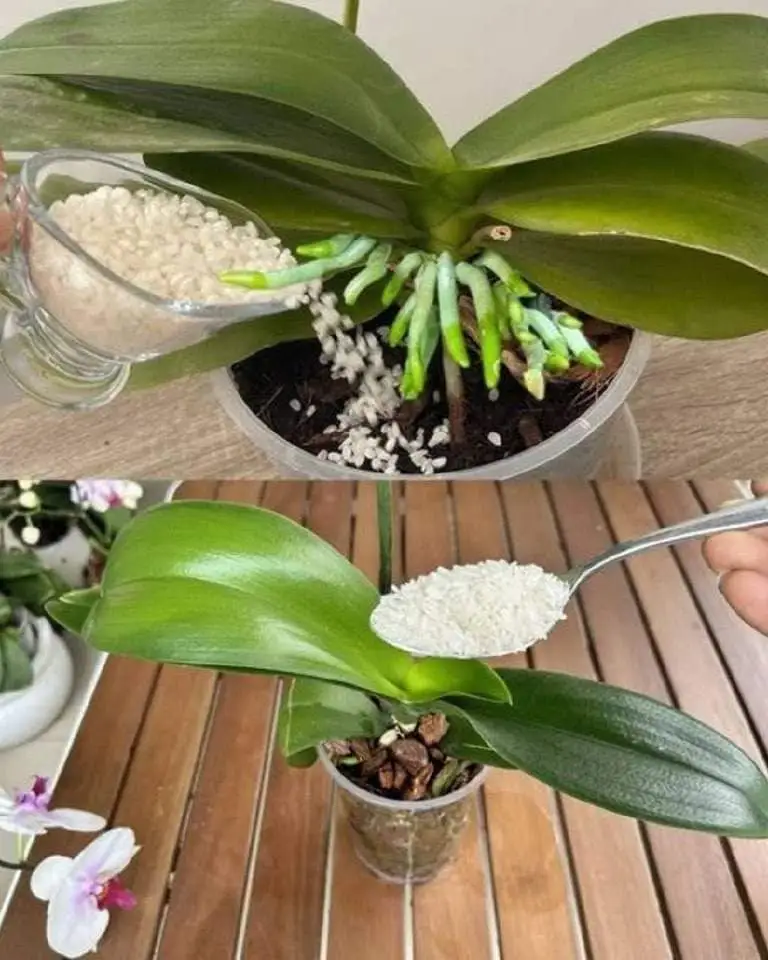Orchids are admired for their beauty and grace, often becoming the centerpiece in any garden or indoor plant collection. However, keeping these delicate plants healthy requires a careful balance of nutrients. While store-bought orchid fertilizers are available, they can be costly and sometimes filled with chemicals that are not suitable for eco-conscious gardeners. Fortunately, there is a natural, cost-effective alternative—using rice as fertilizer.
Rice, a kitchen staple, contains valuable nutrients like nitrogen, phosphorus, and potassium, which are essential for the healthy growth and development of orchids. In this guide, we’ll explore how you can utilize rice to create your own sustainable orchid fertilizer, using simple methods like rice water, rice husk mulch, and rice bran compost.
1. Rice Water Fertilizer
Rice water is rich in nutrients and easy to prepare. This method involves soaking rice grains in water to extract key nutrients that can nourish your orchids.
Ingredients:
- Uncooked rice grains
- Water
Instructions:
- Soak the Rice:
- Take a small container or jar and add 1-2 tablespoons of uncooked rice.
- Pour in enough water to completely submerge the rice.
- Wait:
- Let the rice soak for 24-48 hours to allow nutrients to release into the water.
- Strain the Rice Water:
- After soaking, strain the liquid into another container, discarding the rice grains.
- Dilute the Rice Water:
- Dilute the rice water with an equal amount of fresh water before using it on your orchids.
- Fertilize:
- Water your orchids with the diluted rice water once a month during the growing season (spring and summer).
Tip: This rice water can be stored in a cool place for future use, but make sure to check it for any off smells, as it can spoil over time.
2. Rice Husk Mulch
Rice husks, often considered waste, are an excellent mulch option for orchids. Mulching helps retain moisture, regulates temperature, and slowly releases nutrients into the soil as it breaks down.
Ingredients:
- Uncooked rice husks
Instructions:
- Layer the Husks:
- Spread a layer of uncooked rice husks over the orchid’s potting soil.
- Thickness:
- Make sure the rice husk layer is 1-2 inches thick for optimal results.
- Nutrient Release:
- As you water your orchids, the rice husks will gradually break down, releasing nutrients into the soil and enhancing root development.
Note: Rice husk mulch is an excellent way to provide slow-release nutrients, reducing the need for frequent fertilization.
3. Rice Bran Compost
Rice bran, a byproduct of rice milling, is rich in organic matter and can be combined with compost to create a nutrient-dense mix for your orchids. This mix is especially useful when repotting or refreshing the soil.
Ingredients:
- Rice bran
- Organic compost
Instructions:
- Mix Together:
- Combine equal parts rice bran and organic compost.
- Use During Repotting:
- When repotting or refreshing your orchid’s potting soil, add this rice bran and compost mixture to provide a nutrient boost.
- Promote Growth:
- This mixture improves soil structure and enriches it with essential nutrients, promoting healthy root systems and vigorous orchid growth.
Tip: Rice bran is highly absorbent, so it helps maintain proper moisture levels in the potting medium, which is crucial for orchid care.
Sustainability Benefits of Using Rice-Based Fertilizers
Incorporating rice into your orchid care routine is not only beneficial for the plants but also aligns with sustainable gardening practices. By repurposing everyday household items like rice, you are reducing waste and lowering your reliance on chemical fertilizers. This eco-friendly approach supports the health of your plants and the environment.
- Cost-Effective: Rice is affordable and accessible, making it an ideal fertilizer option for anyone looking to save money.
- Chemical-Free: Avoiding synthetic chemicals helps maintain a more natural growing environment for your orchids and contributes to healthier ecosystems.
- Reduce Waste: Using rice husks or leftover rice water repurposes materials that might otherwise be discarded.
Important Tips for Using Rice-Based Fertilizers
While rice-based fertilizers are gentle on orchids, it’s important to avoid over-fertilization. Orchids are sensitive plants that require a careful balance of nutrients, and too much fertilizer can lead to root burn or nutrient buildup. Here’s how to monitor and adjust your orchid care routine:
- Frequency: Stick to fertilizing with rice water only once a month during the active growing season. For rice husk mulch and rice bran compost, you can refresh these with each repotting or as the materials break down.
- Observe Growth: Keep an eye on your orchid’s growth and blooming patterns. If the leaves look yellowish or growth seems stunted, you may need to adjust your fertilizing schedule.
- Watering: Continue with your normal watering routine between fertilizing sessions, ensuring the roots are getting enough moisture without sitting in water.
Conclusion
Using rice as a fertilizer for orchids is a natural, eco-friendly, and effective way to promote healthy growth and vibrant blooms. Whether through rice water, husks, or bran, you can provide your orchids with essential nutrients while reducing waste and avoiding chemicals. With regular care and mindful fertilization, your orchids will thrive and continue to add beauty and elegance to your space.
So the next time you cook rice, don’t throw away the water or husks—use them to nurture your orchids and enjoy the benefits of this sustainable gardening practice!
